领导科学
- 格式:doc
- 大小:75.05 KB
- 文档页数:31
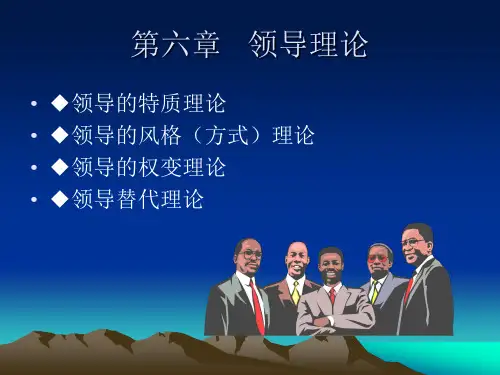
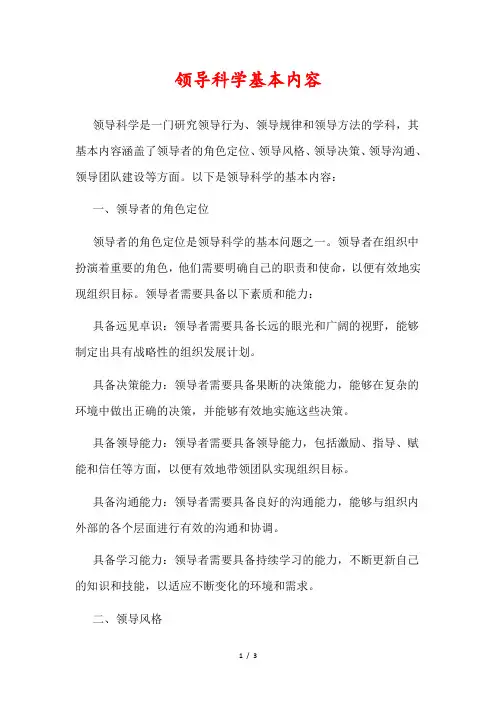
领导科学基本内容领导科学是一门研究领导行为、领导规律和领导方法的学科,其基本内容涵盖了领导者的角色定位、领导风格、领导决策、领导沟通、领导团队建设等方面。
以下是领导科学的基本内容:一、领导者的角色定位领导者的角色定位是领导科学的基本问题之一。
领导者在组织中扮演着重要的角色,他们需要明确自己的职责和使命,以便有效地实现组织目标。
领导者需要具备以下素质和能力:具备远见卓识:领导者需要具备长远的眼光和广阔的视野,能够制定出具有战略性的组织发展计划。
具备决策能力:领导者需要具备果断的决策能力,能够在复杂的环境中做出正确的决策,并能够有效地实施这些决策。
具备领导能力:领导者需要具备领导能力,包括激励、指导、赋能和信任等方面,以便有效地带领团队实现组织目标。
具备沟通能力:领导者需要具备良好的沟通能力,能够与组织内外部的各个层面进行有效的沟通和协调。
具备学习能力:领导者需要具备持续学习的能力,不断更新自己的知识和技能,以适应不断变化的环境和需求。
二、领导风格领导风格是领导科学中的另一个重要问题。
领导风格是指领导者在实施领导行为时所采取的不同方式和方法。
以下是几种常见的领导风格:命令式领导:这种领导风格强调对组织的控制和命令,领导者会明确地告诉团队成员应该做什么和如何做。
这种风格的优点在于能够快速地实施决策,但也可能限制团队的创造力和积极性。
授权式领导:这种领导风格强调对团队的授权和信任,领导者会给予团队成员更多的自主权和决策权,以激发他们的创造力和责任感。
这种风格的优点在于能够提高团队的主动性和责任感,但也可能导致团队成员在决策上出现偏差或错误。
支持式领导:这种领导风格强调对团队成员的支持和关心,领导者会关注团队成员的需求和感受,并在必要时提供帮助和支持。
这种风格的优点在于能够增强团队成员的归属感和忠诚度,但也可能导致领导者过度关注细节而忽略组织的整体发展。
情境式领导:这种领导风格强调根据不同的情境和团队成员的需求采取不同的领导方式,以达到最佳的领导效果。
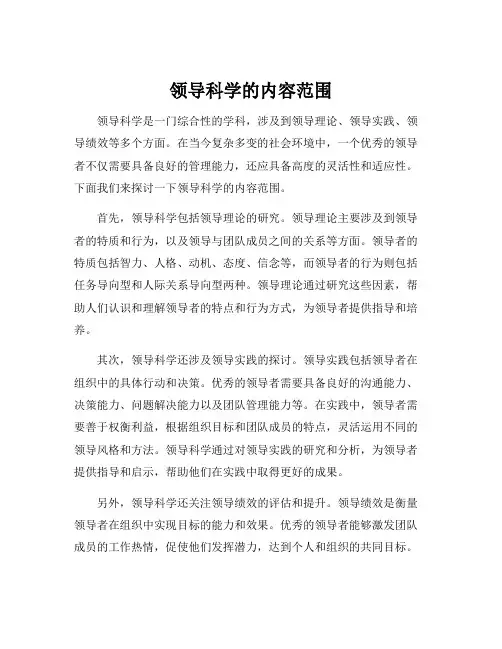
领导科学的内容范围领导科学是一门综合性的学科,涉及到领导理论、领导实践、领导绩效等多个方面。
在当今复杂多变的社会环境中,一个优秀的领导者不仅需要具备良好的管理能力,还应具备高度的灵活性和适应性。
下面我们来探讨一下领导科学的内容范围。
首先,领导科学包括领导理论的研究。
领导理论主要涉及到领导者的特质和行为,以及领导与团队成员之间的关系等方面。
领导者的特质包括智力、人格、动机、态度、信念等,而领导者的行为则包括任务导向型和人际关系导向型两种。
领导理论通过研究这些因素,帮助人们认识和理解领导者的特点和行为方式,为领导者提供指导和培养。
其次,领导科学还涉及领导实践的探讨。
领导实践包括领导者在组织中的具体行动和决策。
优秀的领导者需要具备良好的沟通能力、决策能力、问题解决能力以及团队管理能力等。
在实践中,领导者需要善于权衡利益,根据组织目标和团队成员的特点,灵活运用不同的领导风格和方法。
领导科学通过对领导实践的研究和分析,为领导者提供指导和启示,帮助他们在实践中取得更好的成果。
另外,领导科学还关注领导绩效的评估和提升。
领导绩效是衡量领导者在组织中实现目标的能力和效果。
优秀的领导者能够激发团队成员的工作热情,促使他们发挥潜力,达到个人和组织的共同目标。
领导科学通过识别领导绩效的关键指标,并研究领导者的行为和决策与绩效之间的关系,为领导者提供有效的绩效评估和提升方法。
最后,领导科学还探讨领导者在不同领域和环境中的应用。
领导者不仅可以在商业组织中发挥作用,还可以在政府、教育、医疗等领域发挥重要的领导作用。
领导科学通过研究和实践,为不同领域的领导者提供适用的领导模型和方法论。
总之,领导科学是一门内容丰富、涵盖面广的学科。
它旨在研究和探索领导者的特质和行为,提供实践指导,评估和提升领导绩效,并帮助领导者在不同领域应用领导技能。
领导科学的发展对于培养和提升优秀的领导者具有重要的意义,也有助于组织和社会的可持续发展。
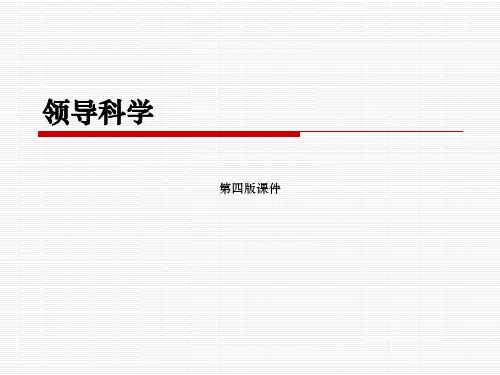
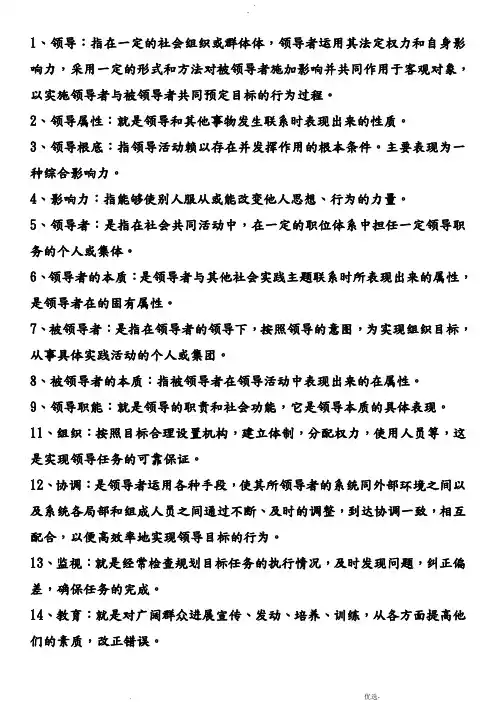
1、领导:指在一定的社会组织或群体体,领导者运用其法定权力和自身影响力,采用一定的形式和方法对被领导者施加影响并共同作用于客观对象,以实施领导者与被领导者共同预定目标的行为过程。
2、领导属性:就是领导和其他事物发生联系时表现出来的性质。
3、领导根底:指领导活动赖以存在并发挥作用的根本条件。
主要表现为一种综合影响力。
4、影响力:指能够使别人服从或能改变他人思想、行为的力量。
5、领导者:是指在社会共同活动中,在一定的职位体系中担任一定领导职务的个人或集体。
6、领导者的本质:是领导者与其他社会实践主题联系时所表现出来的属性,是领导者在的固有属性。
7、被领导者:是指在领导者的领导下,按照领导的意图,为实现组织目标,从事具体实践活动的个人或集团。
8、被领导者的本质:指被领导者在领导活动中表现出来的在属性。
9、领导职能:就是领导的职责和社会功能,它是领导本质的具体表现。
11、组织:按照目标合理设置机构,建立体制,分配权力,使用人员等,这是实现领导任务的可靠保证。
12、协调:是领导者运用各种手段,使其所领导者的系统同外部环境之间以及系统各局部和组成人员之间通过不断、及时的调整,到达协调一致,相互配合,以便高效率地实现领导目标的行为。
13、监视:就是经常检查规划目标任务的执行情况,及时发现问题,纠正偏差,确保任务的完成。
14、教育:就是对广阔群众进展宣传、发动、培养、训练,从各方面提高他们的素质,改正错误。
15、职务:是指领导者处于一定的职位和由此产生的职能。
权利:包括履行领导职能所需要的各种权力。
责任:是领导者必须承担与权利相对应的义务和行为后果。
利益:是指与职务相联系的一定的报酬形式。
16、领导观念:是专指领导者对领导活动过程及其规律的本质认识。
领导观念具有社会历史性,其形成是特定的社会历史条件的产物。
17、政治观念:是指领导者对国家、民族、阶级、政党、社会集团和社会势力等在国家生活和国际关系等方面的制度、政策、活动、作用及其相互关系的看法或意识。
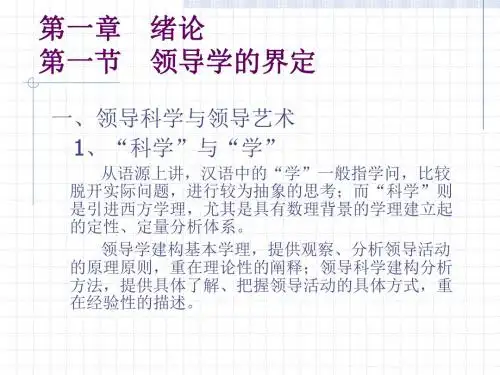
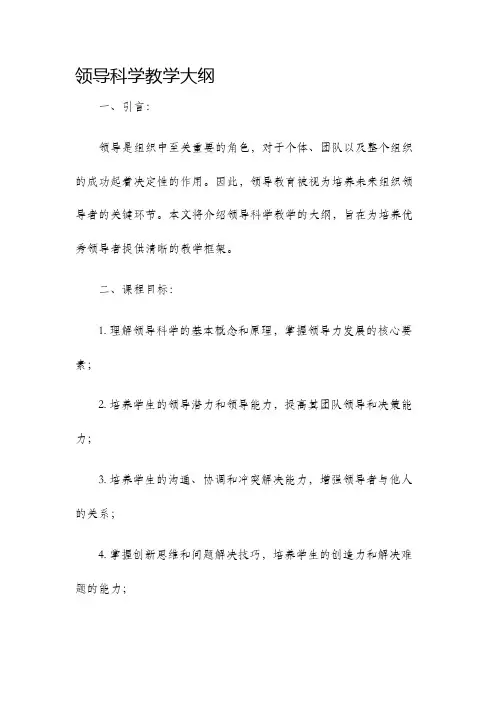
领导科学教学大纲一、引言:领导是组织中至关重要的角色,对于个体、团队以及整个组织的成功起着决定性的作用。
因此,领导教育被视为培养未来组织领导者的关键环节。
本文将介绍领导科学教学的大纲,旨在为培养优秀领导者提供清晰的教学框架。
二、课程目标:1. 理解领导科学的基本概念和原理,掌握领导力发展的核心要素;2. 培养学生的领导潜力和领导能力,提高其团队领导和决策能力;3. 培养学生的沟通、协调和冲突解决能力,增强领导者与他人的关系;4. 掌握创新思维和问题解决技巧,培养学生的创造力和解决难题的能力;5. 培养学生的情商和社交能力,提高其领导者的情绪智慧和影响力;6. 培养学生的道德和伦理观念,培养他们成为有担当的领导者。
三、教学内容:1. 领导科学概述- 领导的定义和基本概念- 领导与管理的区别- 领导力的主要理论和模型2. 领导力发展- 领导力培养的重要性- 领导力发展的阶段和路径- 领导力发展的挑战和机遇3. 团队领导与决策- 团队领导的特点和技巧- 团队决策的方法和流程- 团队建设和团队绩效评估4. 沟通与协调- 沟通的基本原则和技巧- 协调和合作的方法与实践- 导向沟通和双赢协商的重要性5. 创新思维与问题解决- 创新思维的培养和激发- 问题解决的基本流程和工具 - 创新管理和创新团队的构建6. 情商与影响力- 情商的概念和重要性- 情商的培养和提升- 影响力的建立和运用7. 道德与伦理- 领导者的道德责任和义务- 领导者的伦理标准和行为规范- 领导者的价值观和决策原则四、教学方法:1. 课堂讲授:通过系统的讲解和案例分析,向学生传授领导科学的基本理论和概念;2. 小组讨论:组织学生分小组进行实际案例分析和问题解决,培养他们的团队领导和决策能力;3. 角色扮演:通过模拟实际情境,让学生扮演领导角色,锻炼他们的沟通和协调能力;4. 个人作业:要求学生撰写个人心得体会、案例分析或研究报告,培养学生的研究和创新能力;5. 案例研讨:分析和讨论实际领导案例,引导学生思考和讨论领导行为的合理性和有效性。
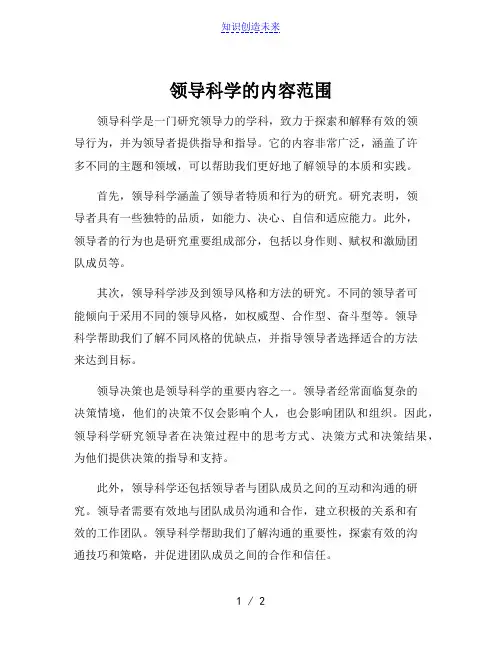
领导科学的内容范围领导科学是一门研究领导力的学科,致力于探索和解释有效的领导行为,并为领导者提供指导和指导。
它的内容非常广泛,涵盖了许多不同的主题和领域,可以帮助我们更好地了解领导的本质和实践。
首先,领导科学涵盖了领导者特质和行为的研究。
研究表明,领导者具有一些独特的品质,如能力、决心、自信和适应能力。
此外,领导者的行为也是研究重要组成部分,包括以身作则、赋权和激励团队成员等。
其次,领导科学涉及到领导风格和方法的研究。
不同的领导者可能倾向于采用不同的领导风格,如权威型、合作型、奋斗型等。
领导科学帮助我们了解不同风格的优缺点,并指导领导者选择适合的方法来达到目标。
领导决策也是领导科学的重要内容之一。
领导者经常面临复杂的决策情境,他们的决策不仅会影响个人,也会影响团队和组织。
因此,领导科学研究领导者在决策过程中的思考方式、决策方式和决策结果,为他们提供决策的指导和支持。
此外,领导科学还包括领导者与团队成员之间的互动和沟通的研究。
领导者需要有效地与团队成员沟通和合作,建立积极的关系和有效的工作团队。
领导科学帮助我们了解沟通的重要性,探索有效的沟通技巧和策略,并促进团队成员之间的合作和信任。
最后,领导科学还涉及到领导者的个人成长和发展的研究。
领导者不仅需要具备一定的领导素质和技能,还需要持续学习和发展自己。
领导科学研究领导者的学习过程、反思和成长,为他们提供个人发展和持续进步的指导。
综上所述,领导科学是一门广泛而丰富的学科,涵盖了领导者特质、行为、风格、决策、沟通以及个人发展等方面的内容。
通过研究和理解领导科学的知识,领导者能够更好地理解和运用领导原则,提升自己的领导能力,并在组织和团队中取得更好的成果。
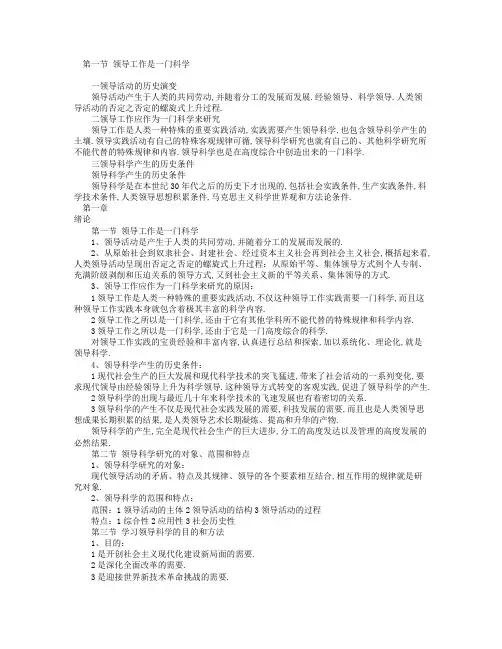
第一节领导工作是一门科学一领导活动的历史演变领导活动产生于人类的共同劳动,并随着分工的发展而发展.经验领导、科学领导.人类领导活动的否定之否定的螺旋式上升过程.二领导工作应作为一门科学来研究领导工作是人类一种特殊的重要实践活动,实践需要产生领导科学,也包含领导科学产生的土壤.领导实践活动有自己的特殊客观规律可循,领导科学研究也就有自己的、其他科学研究所不能代替的特殊规律和内容.领导科学也是在高度综合中创造出来的一门科学.三领导科学产生的历史条件领导科学产生的历史条件领导科学是在本世纪30年代之后的历史下才出现的,包括社会实践条件,生产实践条件,科学技术条件,人类领导思想积累条件,马克思主义科学世界观和方法论条件.第一章绪论第一节领导工作是一门科学1、领导活动是产生于人类的共同劳动,并随着分工的发展而发展的.2、从原始社会到奴隶社会、封建社会、经过资本主义社会再到社会主义社会,概括起来看,人类领导活动呈现出否定之否定的螺旋式上升过程:从原始平等、集体领导方式到个人专制、充满阶级剥削和压迫关系的领导方式,又到社会主义新的平等关系、集体领导的方式.3、领导工作应作为一门科学来研究的原因:1领导工作是人类一种特殊的重要实践活动,不仅这种领导工作实践需要一门科学,而且这种领导工作实践本身就包含着极其丰富的科学内容.2领导工作之所以是一门科学,还由于它有其他学科所不能代替的特殊规律和科学内容.3领导工作之所以是一门科学,还由于它是一门高度综合的科学.对领导工作实践的宝贵经验和丰富内容,认真进行总结和探索,加以系统化、理论化,就是领导科学.4、领导科学产生的历史条件:1现代社会生产的巨大发展和现代科学技术的突飞猛进,带来了社会活动的一系列变化,要求现代领导由经验领导上升为科学领导.这种领导方式转变的客观实践,促进了领导科学的产生.2领导科学的出现与最近几十年来科学技术的飞速发展也有着密切的关系.3领导科学的产生不仅是现代社会实践发展的需要,科技发展的需要,而且也是人类领导思想成果长期积累的结果,是人类领导艺术长期凝炼、提高和升华的产物.领导科学的产生,完全是现代社会生产的巨大进步,分工的高度发达以及管理的高度发展的必然结果.第二节领导科学研究的对象、范围和特点1、领导科学研究的对象:现代领导活动的矛盾、特点及其规律、领导的各个要素相互结合,相互作用的规律就是研究对象.2、领导科学的范围和特点:范围:1领导活动的主体2领导活动的结构3领导活动的过程特点:1综合性2应用性3社会历史性第三节学习领导科学的目的和方法1、目的:1是开创社会主义现代化建设新局面的需要.2是深化全面改革的需要.3是迎接世界新技术革命挑战的需要.4是促进干部“四化”、实现领导工作科学化的需要.2、建设有中国特色的领导科学要做到:1必须坚持以马列主义、毛泽东思想、邓小平理论为指导.2必须从我国四化建设的实际出发,面对改革、开放和现代化建设的实际.3必须继承、发扬我党的优良传统,认真总结我党的领导实践经验.4必须有分析地借鉴国外和古代的领导思想.3、学习领导科学的方法:理论与实践统一.1要重视学习理论.2要加强理论的应用,坚持理论密切联系实际,要全力总结我党的领导经验,联系我党的历史经验,特别是联系我党领导现代化建设的新鲜经验.3要注重比较研究的方法.第二章领导与领导者、被领导者第一节领导1、领导:指在一定的社会组织或群体体,领导者运用其法定权力和自身影响力,采用一定的形式和方法对被领导者施加影响并共同作用于客观对象,以实施领导者与被领导者共同预定目标的行为过程.2、领导的属性:1领导是社会共同劳动和共同生活的自然需要.2领导活动不仅具有自然属性,尤其还具有社会属性.3、领导的社会属性决定了领导的本质的原因:1领导的社会属性规定着领导的自然属性.2社会属性决定领导活动中主导要素得以形成.3社会属性规定着领导活动基本要素的相互关系.4社会属性不受自然属性改变的影响,仍然决定着领导的本质.4、领导的特征:1领导认识的特征:1原则性2超前性3综合性4创造性5系统性2领导实践的特征:1依附性2目标性3组织性4协调性5超脱性5、领导的基础:领导基础:指领导活动赖以存在并发挥作用的根本条件.主要表现为一种综合影响力.影响力:指能够使别人服从或能改变他人思想、行为的力量.领导的综合影响力的内容及其构成是权力、品德、知识和才能.6、社会主义领导的本质属性社会主义社会的政治、经济、文化条件决定了社会主义的领导的本质就是服务.服务是社会主义领导活动的中心内容,是各项领导活动的根本目的和行为准则.强调领导就是服务,就必须正确处理指挥员和勤务员,主人和公仆、教育者和学生的关系.必须划清资本主义国家所说的服务和社会主义国家所强调的为人民服务之间的界限.第二节领导者1、领导者的本质:领导者与其他社会实践主体联系时所表现出来的属性,是领导者内在的固有属性.社会主义领导的服务本质决定了社会主义领导者的性质和作用应当是当权者、负责人和服务员三位一体的有机统一.2、领导者的特征:1拥有职权:职权是组织赋予的,为实现组织目标的工作权力,职权有明确而严格的限制范围,职权有客观内涵,与领导者的个人的主观特征无关.2负有责任:1政治责任2工作责任3法律责任3提供服务:4富于创新:5多重角色:3、领导者的地位和作用:1领导者在领导活动中居于中心地位;2领导者在领导活动中起发动作用;3领导者在领导活动中起统率作用.第三节被领导者1、被领导者的本质:指被领导者在领导活动中表现出来的内在属性.2、被领导者的特征:1服从性2受动性3对象性4源泉性5不担任职务或担任较低职务3、被领导者的地位和作用:1被领导者是领导者的对应面.2被领导者起着产生与选择领导者的根本作用.3被领导者对领导效能起决定作用.4、什么样的被领导者才是“好的被领导者”1要服从领导2要支持领导3要监督领导.第四节领导者与被领导者的关系1相互信任的关系2相互促进的关系3相互支持的关系4相互转化的关系5相互监督的关系第三章领导的职能和原则第一节领导的职能1、领导职能的地位:1领导职能是确定合理的的组织机构、实现领导科学化的一个重要标志.2领导职能是领导活动科学化的依据.3领导职能的实现情况是检验领导活动结果的依据.2、领导的一般职能:1引导:1 正确地规划目标是引导的核心,领导是为实现某种组织目标而开展的活动,目标应该看成是领导工作的起点.2 正确地提出任务是实现引导的中心环节.3 科学地制定领导方法是引导的重要内容.2指挥:可采取命令、说服、示范等三种方式.3组织:组织功能的有效发挥有赖于组织结构的合理配置,取决于组织结构内在要素的存在形式和组合方式.要求组织结构是一个由决策、执行、监督、咨询、反馈五个部分组成的相互联系的网络系统,要求组织结构具有全方位的建制,并具有生机勃勃的应变能力.4协调:1 通过积极的促进来达到新的平衡.2 通过严肃的纠偏来维护正常的秩序.一个优秀的领导者,应善于协调,统筹兼顾.应坚持平等、公正、彼此尊重的原则;坚持顾全大局,求大同存小异的原则;坚持行政目标一致的原则.5监督:6教育:1政治思想教育是实现领导决策的保证,尤其成为社会主义国家领导的重要职能之一.2业务技术教育是帮助群众完成具体业务的保证.3、当代领导的基本职能:1决策:决策能力包括:1分析问题的能力2逻辑思考的能力3创新能力.要注意:1要善于审时度势,利用机遇.2要不仅实事求是,还要恰如其分,3要善于运用冲突,论证中的冲突有利于激发想象力.4要具有自我否定的批判意识.5要善于评价.2用人:现代人才观认为,凡具有一定的知识和技能,并能为社会的进步和发展服务的人,都是现代化建设需要的人才.领导者用人要注意:1能级、能质对应.2优势定位.3结构优化.3思想政治工作:1 内容和方法必须适应被教育者的思想发展变化规律.2 依靠群众力量做好思想政治工作.3 教育者必须先受教育.第二节领导的原则1、领导的总原则:1党的基本路线原则:2实事求是原则:3民主集中制原则:4群众路线原则:2、领导的基本原则:1统一领导原则:1 组织体制应该坚持统一领导的原则.2 人员序列应该坚持统一领导的原则.解决两种关系:1处理好集权与分权的关系2处理好原则性和灵活性的关系.2分层领导原则:1 分层领导由领导幅度所决定.2 分层领导与领导职能相适应.3 分层领导应该促进领导工作的有效性.3系统整体原则:4权责一致原则:1 职务与权力分离,就会使领导出现工作“虚位”.2 权力与责任的分离是官僚主义产生和泛滥的基础.3 职务与利益相脱离会使领导工作缺乏必要的动力.5民主公开原则:1 能够较好地体现出社会主义领导的本质就是服务.2 将有助于领导决策.3 是群众对领导实行民主监督的前提.4 是提高行政效率的一种行之有效的方法.6集体领导和分工负责相结合的原则:7“相结合”原则:1 一般号召与个别指导相结合的原则.2 原则性和灵活性相结合的原则.首先,要认真学习和掌握马克思主义的基本原理和基本观点其次,要认真学习和深刻领会党和国家的各项路线、方针、政策及有关文件精神.最后,要加强调查研究,了解本地区、本部门、本单位和有关事件的性质、特点和本质.3 长远目标与当前任务相结合的原则.首先,要把长远目标划分为若干阶段和步骤,使当前任务成为长远目标的一部分.其次,要在当前任务中选好重点,并正确处理好重点与一般的关系.最后,要根据长远目标,抓好战略对策,保证当前任务的顺利完成.第四章领导观念第一节领导观念与科学领导的关系1、领导观念:领导观念具有社会历史性,其形成是特定的社会历史条件的产物.2、领导观念在领导过程中的作用:1不同的领导观念决定人们采取不同的领导方式.2不同的领导观念决定人们在领导工作中采取不同的目标以及达到目标的手段.3不同的领导观念决定领导者在领导过程中不同的观察问题的角度和处理问题的方法.4不同的领导观念决定领导者采取不同的评价人和事的尺度.第二节时代与领导观念的更新1、我们所处时代的特点:1从国际来说,世界形势正在发生着重大变化,旧的政治格局尚未形成,世界格局多极化和经济全球化加速发展.2今天的时代,也是知识经济的时代,兴起新的技术革命的时代.知识经济的特点:知识不断创新,高新技术迅速产业化.3今天的时代,还是激烈竞争的时代.2、传统领导观念必须更新:1应该认真对待和清理过去的领导观念.2领导观念更新是不能割断历史的,也不是随心所欲的.我们所说的领导观念更新,是在马克思主义的指导下,坚持一切从实际出发,树立那些符合时代需要,有利推进四化建设的正确的、进步的、优良的新观念,摒弃或改变那些已经过时的、错误的、落后的、腐朽的旧观念.领导观念更新的基本方向:1 在指导思想上由小生产的自然经济封闭型向社会主义市场经济的开放型转变;2 为适应现代化建设发展的需要,并迎接知识经济和新技术革命的挑战,在领导方式上应是由人治型向法治型转变;3 为适应现代化大生产、大经济、大科学的发展需要,在工作方法上应是由经验型向科学型转变.第三节现代领导的新观念1、依法治国观念:依法治国:广大人民群众在党的领导下,依照宪法和法律规定,通过各种途径和形式管理国家事务,管理经济文化事业,管理社会事务,保证国家各项工作都依法进行,逐步社会主义民主的制度化、法制化,使这种制度和法律不因领导人的改变而改变,不因领导人看法和注意力的改变而改变.具体要求:1必须使民主制度化,法律化.2必须强调法律的极大权威,真正做到法律面前人人平等.3必须把立法、守法、执法紧密结合起来.4必须正确处理党的领导和依法治国的关系.2、战略观念:现代领导者要有战略观念,必须具有战略眼光,必须高度重视战略问题.本质特征:1全局性2长期性3层次性怎样树立战略观念1要重视战略依据的研究.2要善于提出战略思想.3要明确地选择战略目标,战略重点和战略步骤.4要大力抓好战略实施.必须强调,战略观念必然要求树立大局观念.3、现代化大经济观念:特征:1从以自给自足为特点的小生产走向社会化大生产;2生产固然仍为十分重要的经济活动,但已不再是唯一重要的经济活动.3越来越实行改革开放.1要树立系统观念系统的特点:1整体性2层次性3功能性.2要树立市场观念1要承认社会主义经济是市场经济.2要承认价值规律的作用.3要充分认识发展市场经济的重要作用.3要树立竞争观念4要树立信息观念信息的特点:1可扩充性2可共享性3时间性.5要树立效益观念4、改革创新观念:1改革意识2创新和进取精神表现在:1要敢于和善于破旧立新,推陈出新,以大无畏的胆略和气魄去支持新生事物,为新生事物的成长面斗争.2要有永不满足的态度.3要勇于探索,积极进取,不甘落后,不怕失败,不怕犯错误.4要积极推进知识创新工程.3开放观念要求:1领导者在对外开放中,要善于对其他国家和地区进行观察、思考和比较,增强我们的时代紧迫感和责任感,进一步激发奋起直追的观念和斗志.2领导者要面向世界,放眼全球,勇于投身世界经济和技术竞争的激流,决心拼搏一番,并获得胜利.3领导者在开放问题上要虚心又要自信,做好批判地吸收的工作.4未来观念要求:1领导者要有远大的理想和战略思想.2领导者要克服工作中的盲目性,提高科学预见性.3领导者要努力学习马克思主义和未来科学.5、新的价值观念:1在社会主义现代化建设中,领导者应把知识、人才看成最有价值的东西,树立尊重知识,尊重人才的观念.2在金钱、财富观念上也要更新,作出新的解析.3还要树立新的时空观念.1充分认识时间是无比宝贵的,学会珍惜时间2要善于抓住时机3要重视讲求时效.第五章领导与决策第一节决策是领导的基本职能1、决策活动的基本特征:1针对性2目标性3实施性4选择性5优化性2、经验决策的主要特点:1这种决策方式一般说来是个人的决策活动,主要依靠决策者个人的素质做出决断.2这种决策方式,本质上讲是以决策者的经验为基础的,所能处理的信息量有限,一般说来是一种定性不定量的的决策.3、科学决策的主要特点:1强调建立科学的决策体制,注重集体共同决策,决策过程中特别注意依靠各种智囊组织,注重各种专家的横向联系,形成合理的人才结构,共同完成某个决策活动.2强调将决策建立在科学分析的基础上,广泛运用科学技术的方法,将定性分析和定量分析结合起来,确保决策的正确性和可靠性.4、决策的分类1依照决策者在管理组织中所处地位不同――高层决策、中层决策、基层决策.2战略决策、战术决策.3最优决策、满意决策.4程序化决策、非程序化决策.5确定性决策、不确定性决策、风险性决策.5、决策的模式:1理性决策的模式:强调决策必须严格地依照科学程序进行,注意运用现代科学的手段、方法和技术来进行决策,注重决策过程中的定量分析,甚至不惜建立起复杂的数学模型.西蒙提出“满意标准”的问题,主张决策者以较为符合现实条件的满意目标来取代追求理想条件的最优目标.2渐进决策的模式:美国的林德布洛姆特点:在决策问题的分析上,渐进决策认为人们的分析能力有限,不可能对与决策有关的所有问题作详尽分析,而是将分析集中在相关的主要问题上.渐进决策把决策看作是前后衔接的不间断过程,从而有助于决策的连续性,渐进决策强调决策是个渐变过程,保持决策的稳定,有利于防止社会的动荡,渐进决策主张根据历史和现实的各种条件来进行决策,同理性决策模式相比,具有更强的现实性.3综合决策的模式:美国的A埃泽奥利用理性决策模式和渐进模式的长处,又注意克服二者的短处,综合地有选择地利用了上述两种模式的原则和方法.认为,当社会环境没有剧烈变化,原有的政策无需重大变动的,就应更多地利用渐进决策模式的原则和方法,减少实际分析问题的范围和内容,找出那些影响问题的最重要的因素进行分析,做出变化较小的新决策,以便保持政策的稳定性和连续性.6、决策在领导工作中的地位:决策是领导者首要的基本职能,决策是贯穿于领导过程始终的活动,决策是领导者履行各项职能的基础,决策的正确与否关系到领导事业的成败.第二节科学决策的原则、程序1、科学决策必须符合的四个标准:1具有准确的决策目标2决策的执行结果能够实现确定的目标3实现决策目标所付出的代价小4决策执行后的副作用相对少.2、科学决策遵循的原则:1客观原则2信息原则3预测原则4程序原则5可行原则6选优原则7“外脑”原则3、科学决策的程序过程1明确问题,确立目标决策目标的制订必须满足几条检验准则:1目标是有的放矢的;2目标是具体的;3目标是系统的;4目标是切实可行的;5目标是符合规范的.2集思广益,拟定方案第一步轮廓设想,第二步细部设计.3分析评估,选择方案对方案进行正确的评估和选择,一是要有合理的评选标准,二是要有科学的评选方法.评选方案的方法有1经验判断法2数学分析法3试验法.4实施方案,完善决策1编制实施计划,把决策具体化;2组织实施力量,保证决策方案的实现;3落实实施责任,建立严格的责任制;4建立反馈系统,及时检查发现决策方案实施中的问题;5纠正决策偏差,必要时进行决策修正或追踪决策.4、追踪决策:追踪决策实质上是对原有决策问题重新进行的一次决策.追踪决策与一般决策相比,有新的特征:1回溯分析2非零起点3双重优化4心理效应第三节决策中的领导者1、现代决策体制的二大特点:1决策中的“多谋”与“善断”的相对分工;2决策的制订和执行的相对分工.2、决策体制的三大系统:1决策的信息系统2决策的智囊系统3决策系统3、决策活动中,领导者的主要职责:1考虑决策目标的确立;2组织决策方案的制订;3负责决策方案的抉择;4领导决策方案的实施.4、领导者对决策方案的抉择方式1集体抉择:缺点:1速度慢,有时会议而不决,贻误时机;2职责不清,因每人分担一份责任,常会导致互相推诿,无人负责.决策时注意的问题1通常只有事关大局的重大问题宜采用集体抉择的方式,而不要事无大小统统依靠集体决定.2集体抉择就应当充分讨论,允许发表各种意见,真正起到集思广益的作用.3事先周密准备,事后一致执行.2个人抉择:优点:责任明确,抉择迅速.缺点:1个人抉择难免受个人知识、经验的限制;2个人抉择容易造成个人专断.5、对领导者抉择的基本要求:1时效性2系统性3民主性4合法性5灵活性6、智囊团成员必须具备的条件:1应当是博才的专家,必须是既具有一门专业知识,又是学识渊博、思路开阔、目光敏锐的人.2应当具有服从科学、服从真理、服从事实的品质,而不能是看着领导的眼色行事、报喜不报忧的人.7、领导者应在几方面发挥好智囊团的作用:1对决策问题进行科学预测;2对决策方案进行具体设计,并对其详细的分析论证;3对决策问题的有关方面进行咨询;4对决策的实施情况进行反馈分析.8、领导者与智囊团的关系:领导者与智囊团的关系是“多谋”和“善断”的关系,二者相辅相成而不是相互取代.一方面,领导者必须保证智囊团的独立研究,甚至允许其唱对台戏,而不把个人的意见强加给他们,更不允许领导已经作出结论,而只让智囊团论证自己结论的准确性.另一方面,领导者又不能让智囊团代替自己决策,不能完全为智囊团的意见所左右,要考虑到智囊团的意见,但不能让他们代替领导者选择方案.第六章领导与选才用人第一节衡量人才的标准和领导选才用人的意义1、人才的特点:1创造性2历史进步性3社会性4专业性5相对性2、人才的类型:1依据工作性质――理论型人才和实践型人才.2自身素质的不同――发现型人才和再现型人才.3发挥作用的不同――组织型人才和操作型人才.3、衡量人才的标准:其具体内容,就是德才兼备,具体化为“四化”即干部的革命化、年轻化、知识化和专业化.4、选才用人对于现代领导的重要意义:1人才是世界上最宝贵的财富,是创造物质财富和精神财富的带头者和推动者.2人才是事业之本,是否正确地选才用人,关系到社会进步、国家兴衰和事业的成败.3人才是我国社会主义现代化建设的栋梁,是否正确地选才用人,对我国现代化建设的成功将起着关键作用.5、人才选拔原则:1察言与观行相结合的原则2考察历史与考察现实相结合的原则3发现人才的长处与认识人才的短处相结合的原则。
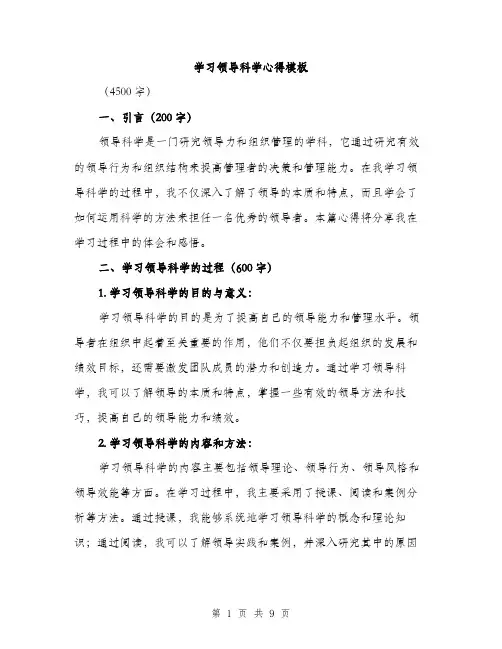
学习领导科学心得模板(4500字)一、引言(200字)领导科学是一门研究领导力和组织管理的学科,它通过研究有效的领导行为和组织结构来提高管理者的决策和管理能力。
在我学习领导科学的过程中,我不仅深入了解了领导的本质和特点,而且学会了如何运用科学的方法来担任一名优秀的领导者。
本篇心得将分享我在学习过程中的体会和感悟。
二、学习领导科学的过程(600字)1. 学习领导科学的目的与意义:学习领导科学的目的是为了提高自己的领导能力和管理水平。
领导者在组织中起着至关重要的作用,他们不仅要担负起组织的发展和绩效目标,还需要激发团队成员的潜力和创造力。
通过学习领导科学,我可以了解领导的本质和特点,掌握一些有效的领导方法和技巧,提高自己的领导能力和绩效。
2. 学习领导科学的内容和方法:学习领导科学的内容主要包括领导理论、领导行为、领导风格和领导效能等方面。
在学习过程中,我主要采用了授课、阅读和案例分析等方法。
通过授课,我能够系统地学习领导科学的概念和理论知识;通过阅读,我可以了解领导实践和案例,并深入研究其中的原因和影响因素;通过案例分析,我可以将学到的理论知识运用到实际问题中,提高自己的决策和管理能力。
3. 学习领导科学的体会和感悟:在学习领导科学的过程中,我深刻体会到了领导的重要性和挑战。
领导者需要具备一定的个人素质和技能,包括智慧、勇气、责任感和人际交往能力等。
只有全面发展这些素质和技能,才能成为一个优秀的领导者。
同时,领导者还需要关注组织的目标和利益,善于抓住机遇和解决问题,保持清晰的思维和灵活的应变能力。
三、领导科学的核心要素和原则(____字)1. 领导的核心要素:领导的核心要素包括领导理论、领导行为和领导能力。
领导理论研究领导的本质和特点,帮助领导者了解自己的角色和责任;领导行为研究领导者的行为和作风,指导领导者如何与下属和同事相处;领导能力研究领导者的决策和管理能力,提高领导者的绩效和影响力。
这三个要素相互依存,缺一不可。
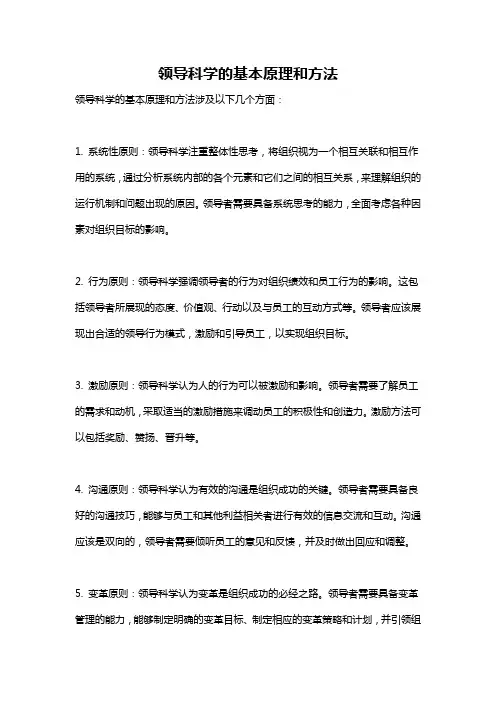
领导科学的基本原理和方法
领导科学的基本原理和方法涉及以下几个方面:
1. 系统性原则:领导科学注重整体性思考,将组织视为一个相互关联和相互作用的系统,通过分析系统内部的各个元素和它们之间的相互关系,来理解组织的运行机制和问题出现的原因。
领导者需要具备系统思考的能力,全面考虑各种因素对组织目标的影响。
2. 行为原则:领导科学强调领导者的行为对组织绩效和员工行为的影响。
这包括领导者所展现的态度、价值观、行动以及与员工的互动方式等。
领导者应该展现出合适的领导行为模式,激励和引导员工,以实现组织目标。
3. 激励原则:领导科学认为人的行为可以被激励和影响。
领导者需要了解员工的需求和动机,采取适当的激励措施来调动员工的积极性和创造力。
激励方法可以包括奖励、赞扬、晋升等。
4. 沟通原则:领导科学认为有效的沟通是组织成功的关键。
领导者需要具备良好的沟通技巧,能够与员工和其他利益相关者进行有效的信息交流和互动。
沟通应该是双向的,领导者需要倾听员工的意见和反馈,并及时做出回应和调整。
5. 变革原则:领导科学认为变革是组织成功的必经之路。
领导者需要具备变革管理的能力,能够制定明确的变革目标、制定相应的变革策略和计划,并引领组
织顺利实施变革。
领导者还需要能够处理变革过程中的阻力和挑战,保持组织内外的稳定与发展。
以上是领导科学的基本原理和方法的一些主要内容,领导者可以根据实际情况和组织需求灵活应用。
领导科学与领导艺术
领导科学与领导艺术是两个不同但又相互关联的概念。
领导科学是指通过研究领导者的行为、能力、特质等方面
的科学方法和理论,来揭示领导者如何有效地管理和指导
组织。
领导科学关注的是领导者的决策、沟通、团队建设、冲突管理等方面的知识和技巧,并借助科学方法来指导领
导者的行为和决策。
领导艺术则侧重于领导者个人的独特魅力与能力,强调领
导者的智慧、判断力、人际关系处理能力等非科学性的方面。
领导艺术认为领导者需要具备一定的感知力、情感智
慧和创造力,才能在不确定和复杂的情境下,灵活地运用
各种技巧和方法来实现组织目标。
在实践中,领导科学和领导艺术常常相互结合。
科学方法
和理论可以帮助领导者提升认知和分析能力,从而做出更
好的决策;而领导艺术则能够给予领导者直觉和直观的指导,使其在实际操作中更加自如和灵活。
总的来说,领导科学强调理性和分析,注重技能和知识;而领导艺术注重直觉和经验,强调洞察力和智慧。
有效的领导者需要同时掌握科学和艺术的要素,并灵活运用在实践中。
第一章绪论一、简单概念1、领导工作是什么时候产生的?自古就有2、领导科学是人类领导活动长期发展的产物。
3、从社会发展的进程来看,领导活动呈现出否定之否定的螺旋式上升的过程。
4、每一时期的领导活动总是受到物质资料生产方式、社会政治关系、科学文化水平三个因素的制约。
5、领导工作形成一门独立的科学是在本世纪30年代。
6、孙武著作的是《孙子兵法》、克劳塞维茨著作的是《战年论》、司马光著作的是《资治通鉴》。
7、领导科学就是专门研究现代领导活动的矛盾、特点及其规律的学问。
8、一切领导都存在着共同的特点就是都要受到一般的客观发展规律的制约。
9、领导科学中最基本的范畴是领导。
10、领导是领导科学研究的出发点和构成整个知识体系的基石。
11、领导是人类群体活动中的必然产物,是一种行为,是一个过程,是完整的实践过程。
12、领导过程包括领导者、被领导者、群体目标、客观环境四个要素。
这些要素所形成的基本矛盾是领导者与被领导者的矛盾、领导者的主观指挥与客观环境的矛盾。
13、领导的本质是通过领导者和被领导者的关系表现出来的。
14、领导的行为是受领导观念支配的。
15、领导的体制包括制度、机构设置、权责划分。
16、领导行为的主体是领导者。
17、领导者的素质是发挥领导作用的基础。
18、达到领导目标的手段是领导方法。
19、领导体制是一种重要的有效的影响力。
20、领导活动的出发点和归宿是领导效能。
21、领导科学的特点是综合性、应用性、社会历史性。
22、管理科学更多的接近软科学,领导科学更接近硬科学。
二、简答题1、为什么说领导工作是一门科学?(1)领导工作是人类一种特殊的重要实践活动。
(2)领导工作之所以是一门科学,还由于它有其他学科所不能代替的特殊规律和科学内容。
(3)领导工作之所以是一门科学,还由于它是一门高度综合的科学。
从以上三个方面,我们完全有理由认为,应把领导工作作为一门科学来研究。
对领导工作实践的经验和丰富内容,认真进行总结和探索,加以系统化、理论化、就是领导科学。
一、填空题1、领导科学是以领导活动为研究对象的科学,其基本任务就是科学地揭示领导工作中合乎规律性的东西。
2、人类最初的领导活动在原始社会就有了。
历史上把这种原始的自然领导制度称为“禅让制”。
3、原始社会只能采取原始的集体领导方式,并常常与_图腾崇拜结合在一起。
4、奴隶社会封建社会,原始的“禅让制”领导制度被父传子的“世袭制”所取代。
故这种小生产条件下的领导,又称为家长式的经验领导。
5、资本主义社会,专家式领导、专家集团式领导等应用而生并逐渐普遍化,科学领导的产生已不可避免。
6、邓小平说:“领导就是服务。
”这是对社会主义领导本质的论述。
7、决策与执行都是统一在一起的。
二者分离的标志是“事业部制”的产生。
8、斯隆被誉为带来“组织革命”的“现代组织之父”。
9、西蒙进而提出“决策工作专门化”的论点。
10、现代咨询除官方内部咨询外,还有非官方的外部咨询,即民间咨询,如美国兰德公司。
11、在咨询建议的自主性、客观性方面,外部咨询优于内部咨询。
12、领导主体集团化为决策的民主化科学化提供了可能。
13、专制统治的根本特征是权力垄断、权责脱离。
14、民主体制的根本特征是权力分享_、权责一致。
15、“事业部制”及民间咨询机构的出现,也是民主制的发端和主要表现形式。
16、法治化必然成为一种维护民主、安全社会、提高领导绩效的现代领导方式。
17、领导活动实践,是领导科学产生的源泉。
18、领导科学就是对领导活动实践的宝贵经验和丰富内容认真进行总结和探索,加以系统化和理论化。
19、现代社会的三门全新的横断科学是系统论、信息论、控制论即,通称为系统理论。
20、领导科学的出现还是现代社会分工发展与深化的结果。
21、社会分工有两个发展方向,一是按照劳动部门的不同进行的横向分工,如历史上最早发生的三次社会大分工;另一是按照劳动过程的不同阶段进行的纵向分工,如决策与执行的分工。
22、马克思主义的产生,在一定意义上标志着人类对领导活动的认识由经验上升为科学。
第1篇一、引言领导科学是一门研究领导活动规律和领导艺术,提高领导效能的学科。
随着我国社会经济的快速发展,对领导人才的需求日益增加。
为了培养具备领导科学素养的高素质人才,领导科学实践教学显得尤为重要。
本文将从领导科学实践教学的意义、内容、方法和效果等方面进行探讨。
二、领导科学实践教学的意义1. 提高学生理论素养。
领导科学实践教学有助于学生将领导科学理论知识与实际相结合,加深对领导科学理论的理解,提高学生的理论素养。
2. 培养学生实践能力。
通过领导科学实践教学,学生可以锻炼自己的组织、协调、沟通和决策能力,为将来从事领导工作打下坚实基础。
3. 促进学生综合素质提升。
领导科学实践教学有助于培养学生团队合作精神、创新意识和社会责任感,提高学生的综合素质。
4. 适应社会需求。
随着我国经济社会的发展,对领导人才的需求日益增加。
领导科学实践教学有助于学生适应社会需求,为将来从事领导工作做好准备。
三、领导科学实践教学的内容1. 领导理论教学。
主要包括领导理论的基本概念、领导类型、领导风格、领导职能等方面的教学。
2. 领导技能训练。
主要包括沟通能力、团队建设、决策能力、问题解决能力等方面的训练。
3. 领导案例分析。
通过对实际领导案例的分析,使学生了解领导活动的规律和领导艺术。
4. 领导模拟实验。
通过模拟实际领导场景,让学生亲身体验领导活动,提高领导能力。
5. 领导课题研究。
鼓励学生结合自身专业和兴趣,开展领导科学课题研究,提高学生的科研能力。
四、领导科学实践教学的方法1. 案例分析法。
通过分析领导案例,使学生了解领导活动的规律和领导艺术,提高学生的领导素养。
2. 模拟实验法。
通过模拟实际领导场景,让学生亲身体验领导活动,提高学生的领导能力。
3. 互动式教学法。
通过课堂讨论、小组合作等形式,激发学生的学习兴趣,提高学生的参与度。
4. 实地考察法。
组织学生到企业、政府等机构进行实地考察,了解领导工作的实际状况,提高学生的实践能力。
领导科学与领导艺术引言领导科学和领导艺术是组织中领导者所需的两种关键能力。
领导的过程既需要基于科学的理论和方法,也需要职业领导者发展出的独特的艺术性技巧和判断力。
本文将探讨领导科学和领导艺术的定义、区别以及如何在组织中应用这两种能力。
领导科学的定义与特点领导科学是通过科学方法和研究,以理论为基础来理解和解释领导行为的学科。
它基于对组织行为和人力资源管理的研究,包括心理学、社会学、组织学等学科的理论基础。
领导科学注重研究领导者与员工的关系、领导风格、沟通技巧等,以提供实践的指导。
领导科学的特点如下:1.理性和客观:领导科学是通过科学的研究方法和分析工具来研究领导行为,强调理性和客观的观察、测量和分析。
2.理论基础:领导科学基于多个学科的理论基础,如心理学、社会学和组织学等,以提供对领导行为的理论解释和预测。
3.实践导向:领导科学旨在为组织和领导者提供实践的建议和指导,帮助他们改善领导效能和员工绩效。
领导艺术的定义与特点领导艺术是指领导者发展出的个人技巧、洞察力和判断力,使他们能够有效地应对各种挑战和变化,并与员工建立积极和高效的关系。
领导艺术强调领导者的个人素质、直觉和经验,不仅依赖于理论和研究。
领导艺术的特点如下:1.主观性和个人化:领导艺术强调领导者的主观能动性和个人风格,每个领导者都有自己独特的领导方式和偏好。
2.情感和人际关系:领导艺术关注领导者与员工之间的情感联系,通过建立和维护积极的人际关系来促进团队合作和绩效。
3.反思和学习:领导艺术要求领导者反思自己的行为和效果,不断学习和改进自己的领导技巧和做法。
领导科学与领导艺术的区别领导科学和领导艺术在以下几个方面存在区别:1.研究对象:领导科学研究的对象主要是领导行为、领导风格和领导与员工关系等,而领导艺术研究的对象是领导者的个人技巧、洞察力和判断力。
2.方法和理论:领导科学依赖于科学的方法和多个学科的理论基础,注重理性和客观;而领导艺术强调领导者的主观能动性和个人风格,运用个人素质和经验来解决问题。
大学四级模拟1168Part Ⅰ Writing1、Your composition should be no less than 120 words. Remember to write it neatly.假设你是李文,请你就学校假期的安排给教育部部长写一封信,向他建议将学校传统的长假调整为几次短假并陈述相关的原因,比如:学习时间过长可能引起过度疲劳,而放假过长则可能导致浪费时间等等。
Part Ⅱ Reading Comprehension (Skimming and Scanning)Health Care and Epidemics (流行病)Everyone suffers from disease at some time or another. However, millions of people around the world do not have good healthcare. Sometimes they have no money to pay for medical treatment. Sometimes they have money, but there is no doctor. Sometimes the doctor does not know how to treat the disease, and sometimes there is no treatment. Some people are afraid of doctors. When these conditions are present in large population centers, epidemics can start.Epidemics can change history. Explorations and wars cause different groups of people to come into contact with other. They carry strange disease to each other. For example, when the Europeans first came to North and South America, they brought diseases with them that killed about 95 percent of the Native American population. People are very afraid of unknown things, especiallydiseases. People have all kinds of ideas about how to prevent and treat disease. Some people think that if you eat lots of onions or garlic, you won' t get sick. Others say you should take huge amounts of vitamins. Scientific experiments have not proved most of these theories. However, people still spend millions of dollars on vitamins and other probably useless treatments or preventatives. Some people want antibiotics whenever they get sick. Some antibiotics are very expensive. Much of this money is wasted because some diseases are caused by a virus. Viruses are even smaller than bacteria, and they cause different kinds of diseases. Antibiotics are useless against viruses.Because of their fear, people can be cruel to victims of disease. Sometimes they fire them from their jobs, throw them out of their apartments, and refuse them transportation services.In the plague (瘟疫) epidemics a few hundred years ago, people simply covered the doors and windows of the victim' s houses and left them to die inside, all in an effort to protect themselves from gettingsick.Doctors know how most epidemic diseases spread. Some, like tuberculosis, are spread when people' s sneeze (喷嚏) sends the bacteria shooting out into the air. Then they enter the mouth or nose of anyone nearby.Others are spread through human contact, such as on the hands. When you are sick and blow your nose, you get viruses or bacteria on your hands. Then you touch another person' s hand, and when that person touches his or her mouth, nose, or eyes, the disease entersthe body. Some diseases spread when people touch the same dishes, towels, and furniture. You can pick up a disease when you touchthings in public buildings.Other diseases are spread through insects such as flies, mosquitoes, and ticks.One disease that causes frequent, worldwide epidemics is influenza, or flu for short. The symptoms (症状) of influenza include headache and sometimes a runny nose. Some victims get sick to their stomachs. These symptoms are similar to symptoms of other, milder diseases. Influenza can be a much more serious disease, especially for pregnant women, people over sixty-five, and people already suffering from another disease, such as heart problems. About half of all flu patients have a high body temperature, called a fever. Flu is very contagious. One person catches the flu from another person; itdoesn't begin inside the body as heart disease does.Sometimes medicine can relieve the symptoms. That is, it can makea person cough less, make headaches less intense, and stop noses from running for a while. However, medicine can ' t always cure the disease. So far, there is no cure for many diseases and no medicineto prevent them. People have to try to prevent them in other ways.Some diseases can be prevented by vaccination (接种疫苗). A liquid vaccine is injected into the arm or taken by mouth and the person is safe from catching that disease. Other diseases can be prevented by good health habits, such as drinking only clean water, boiling water that might carry disease,, and washing the 'hands often.Epidemics usually start in areas of large population. Poor people in big cities who live crowded together in miserable conditions have the most health problems. They often have the least education about disease prevention. For example, it is difficult for a person who has no electricity to refrigerate food or boil drinking water. With no money, the person can' t even buy soap to wash his or her hands.Disease prevention costs much less than disease treatment. It seems completely illogical, but some countries like the United States spend much more health-care money on treatment for diseases than on programs to prevent disease in the first place. Most doctors andother hospital workers stay in their institutions. Only a few doctors go out into the streets of the poor areas to educate the people. Only a few doctors and some nurses vaccinate people and supervise them to make sure they take their medicine. Most people who help the poor people with their health problems are volunteers.How can you use all this information for your own good health? When someone you know becomes ill, try to avoid physical contact with that person. If you get sick yourself, keep your towel and dishes separate from everyone else' s. Try not to touch things that belong to others. Don' t touch other people, and don' t shakehands. Explain why, however--you don' t want people to think you are impolite. Wash your hands often if you are ill or if anyone around you is ill.Researchers continue searching for a way to cure or prevent epidemic diseases. Meanwhile, it is worth the money for governments to provide preventative health care for all of their people. Preventing epidemics is much cheaper than stopping them after they have started and thousands of people are ill.1、This passage is mainly about how epidemics spread and how to prevent in advance.2、When there are no efficient doctors in large population centers, epidemics start.3、Antibiotics have no effect on diseases caused by viruses.4、In the past, epidemics spread much faster than at present.5、The symptoms of influenza are quite similar to those of other more serious diseases.6、People in remote areas who live in miserable conditions have the most health problems.7、The United States spend much more money on programs to prevent diseases than on treatment for diseases.8、Besides pregnant women, people over sixty-five, Influenza can be an especially serious disease for people ____________________.9、Epidemic diseases usually spread through people's sneeze, human contact, and ____________________.10、Diseases can be prevented by means of vaccination or____________________.Part Ⅲ Listening ComprehensionSection A11、 A) Where was the massage left. B) What the person said about Margaret.C) When the message was left. D) What information the person left.12、 A) She's probably been in and out all week. B) She is probably not here on Sunday.C) She has probably no free time this week. D) She has probably tried to call.13、 A) Check if the status of the television is ready.B) Help the woman buy a new television before Friday.C) Fix the woman's television.D) Order a new television for the woman.14、 A) The movie did not get any reviews.B) The movie was worth the price.C) It's a pity the woman didn't watch the movie.D) He agrees with the woman about the movie.15、 A) He was preparing for next week's exam. B) He wishes he could go to the movie.C) He didn't like watching movies. D) He has seen the movie before.16、 A) She is a chemist and has to do lots of experiments.B) He must be extremely careful.C) He is very careless during the experiment.D) She doesn't think the man is right.17、 A) The man should buy a meal ticket every month.B) Paying each meal separately will save lots of money.C) Buying the meal ticket won't save the man money.D) The price of each meal is different.18、 A) She will help him make the model. B) She completed her model quickly.C) She is very smart and clever. D) She thinks he can also finish it quickly.16、 A) Her mild temper. B) Her broad knowledge.C) Her teaching style. D) Her detailed answers.17、 A) Enter the stock market instead of investing in clothing.B) Move to another residence from Wall Street.C) Transfer his investment to the Chinese stock market.D) Share his money-making experience with other marketers.18、 A) Sign his name for the fan. B) Fill in an application form.C) Exchange gifts with his friends. D) Get a purchase refunded.19、 [A] He is a teacher of English in Cambridge.[B] He is a specialist in computer science.[C] He is a consultant to a Scottish company.[D] He is a British tourist to China.20、[A] 22℃.[B] 23℃.[C] 25℃.[D] 34℃.21、 [A] With an English family.[B] In a flat near the college.[C] With a language teacher.[D] In a student dormitory.22、 [A] Certain things cannot be learned from books.[B] Foreign students had better live on campus.[C] Choice of where to live varies from person to person.[D] British families usually welcome foreign students.Section B26、 A) How to improve transportation.B) The best transportation facilities.C) A comparison between railway and airplane.D) Transportation in China.27、 A) Not comfortable. B) Rather crowded and slow.C) Interval is long. D) Cannot reach suburban areas.28、 A) By buses. B) By private cars. C) Byrail. D) By air.30、 A) It's economical. B) It helps build relations with others.C) It's safe and convenient. D) It's quite an experience.31、 A) They should devote time to their housekeeping. B) They should behave themselves in study.C) They should deal with the sanitary work. D) They should obey relevant regulations.32、 A) Students are not free to choose roommates. B) Students may have to furnish their own apartments.C) Living off campus is not as good as living on campus. D) Living off campus may be a bit expensive.30、 A) A short presentation clearly delivered. B) A package of ideas formally presented.C) A clever use of visual aids in presentation. D) A natural and spontaneous style of speech.31、 A) The skillful use of gestures and facial expressions.B) Differences in style between writing and speaking.C) The importance of preparation.D) Different preferences of audiences.32、 A) The key to becoming a good speaker.B) The increasing importance of public speaking.C) The significance of cross-cultural communication.D) The differences between American and Asian cultures.29、 A) Studying yoga. B) Adult education.C) Playing tennis. D) The search for physical fitness.30、 A) The job market. B) Their formerschools.C) Good schools. D) The local high school or colleges.31、 A) Because they want to return to the job market.B) Because they want to learn something new.C) Because they want to make up for the education they missed.D) Because they want to prove themselves to be useful.Section CWhat was the most popular mix about the United States in the 19th century was that of the free and simple life of the farmer. It was said that the farmers worked hard on their own landto (36) whatever their families' needed. They might sometimes trade with their neighbors, but in general they could get along just fineby relying on themselves, not on (37) ties with others. This is how Thomas Jefferson (38) the farmers at the beginning of the 19th century. And at that time, this may have been close to the truth especially on the (39) . But by the mid century sweeping changesin (40) were well under way as farmers began to specialize in the raising of crops such as cotton or corn or wheat. By late in the century (41) inventions in farm (42) has vastly increased the production of specialized crops and (43) network of railroads had linked farmers throughout the country to market in the east and even overseas. By raising and selling specialized crops, (44) . Now farmers were no longer dependent just on the weather and their own efforts, (45) .As businessmen, farmers now had to (46) And so by the end of the 19th century, the era of Jefferson's independentfarmer had come to a close.Part Ⅳ Reading Comprehension (Reading in Depth)Section AMass travel is just that —travel for the masses. Over 600 hundred million people will fly, drive, sail or go by train to a foreign destination this year.Global earnings from tourism this year will exceed $ 450 billion. Within the next fifteen years, the tourism business is expected to expand fourfold and to generate receipts in excess of $ 1.5 trillion, according to the World Travel Organization. Add in other types of travel, such as business, to recreational travel and you have an industry that is worth perhaps double that amount —and employs more than 200 million people worldwide.Nowhere is exempt(免除)from this explosion of movement. From themost remote island in the Pacific to the deepest valley in the Himalayas and the driest areas of Sahara, tourism is leaving its mark. Toilets for tourists are now provided at base camps on the slopes of Mount Qomolangma. Special landing craft fan out from luxury ships to explore the most remote beaches in the Galapagos Island.Europe remains the motor of this industry, although its old dominance is slipping in the face of Asian competition. Today,60% of all tourist arrivals are in Europe, (down from 69% in 1975), and receipts for tourism at $ 214 billion are more than three times higher than those in the US ($ 64 billion). No fewer than one infive tourists (120 million 1997) go to the Mediterranean alone.Tourism is a mixed blessing. Tourism generates wealth, employment —and enjoyment, at least, for the tourists, However, it has its downside, too. Environmentalists who wish to protect the world's beauty spots, peasants in developing countries forced off their landto make room for tourists' golf courses, governments worried about "moral pollution" are just a few of those uneasy at the sudden and startling democratization of travel. Nor should we forget exhaustedair traffic controllers, coping with greatly increased numbers of aircraft queuing to take off and land.47、The World Travel Organization predicts that the tourismbusiness______.48、Tourism industry______ for 200 million people worldwide.49、The explosion of movement refers to______.50、Why is tourism a mixed blessing?51、The environmentalists who are against the fast expansion of tourism may think______.Impressionism is a form of art that began in the 1870's. Whenyou look closely at an impressionist painting, you see little dots of different colored paints. When you move away from the picture, the dots of colors blend together and the painting looks like it haslight playing on the people and objects in the picture. Impressionist art is different from traditional art. Traditional painters were interested in the form of objects. The impressionists were interested in light and color. The impressionist painters wanted to paintnatural light that was lively and bright. They tried to express the feeling of pure sunshine in their paintings. When traditionalartists mixed paints, they could not create the feeling of bright, natural light. Therefore, instead of mixing colors, theimpressionists used small dots of pure colors. The viewers'eyes put these unmixed colors together the same way they add color in light together. When you look at an impressionist painting, it feels the same as when you look at an object in lively, natural sunlight.Traditional painters worked inside. Impressionist painters worked outside because they wanted to paint the effect of sunlight on objects. Monet, for example, made a series of paintings of a haystack (干草堆). Every morning he went to a field with eight or ten paintings. All day, he sat in front of a haystack painting. Every hour he worked on a different picture. All of these paintings are pictures of the haystack, but they do not look the same. Monet made his paintings directly from the changing of nature, especially from different hours of sunlight. His study of the haystack is an hour-by-hour record of the artistry of light.Questions:47、Why are there many dots on an impressionist painting?________________________.48、If an impressionist painter draws an apple, what part of the apple will attract the painter's attention most?________________________.49、What do traditional painters fail to do?________________________.50、By saying that traditional painters worked inside, we can conclude that they. ignore________________________.51、Why did Monet work on a different picture every hour?________________________.Section BPassage OneGoing online is a favorite pastime for millions of American children. Almost 10 million (14 percent) of America's 69 million children are online. The Internet both entertains and educates children, however, there are some possible negative consequences for children who access kid-based Web sites. Advertising on kid-based Web sites has become both a rapidly growing market for consumer companies and a concern for parents. With a click on an icon, children can link to advertisers and be granted tremendous spending power. Children arean important target group for consumer companies. Children under age 12 spent $14 billion, teenagers another $67 billion, and together they influenced$160 billion of their parents' incomes.Many critics question the appropriateness of targeting children in Internet advertising and press to require that children be treated as a "special case" by advertisers. Because children lack the analytical abilities and judgment of adults, they may be unable to evaluate the accuracy of information they view, or understand that the information they provide to advertisers is really just data collected by an advertiser. Children generally lack the ability to give consent tothe release of personal information to an advertiser, an even greater problem for children when they are offered incentives for providing personal information, or when personal information is required before they are allowed to register for various services. Children may not realize that in many cases these characters provide hotlinks directly to advertising sites.The Internet does present some challenges for advertisers who want to be ethical in their marketing practices. Many advertisers arguethat we underestimate the levels of media awareness shown by children. By the age of seven or eight most children can recognize an advertisement and know that its purpose is to sell something and are able to make judgments about the products shown in advertisements. However, this somewhat optimistic and decidedly libertarian view of children runs aground when we realise that they are (like asurprising number of adults) unable to judge accurately between entertainment and advertising. Adults can fend for themselves but, as marketers, we should be explicit about our purpose when advertisingto children on the Internet.57、According to the first paragraph, children as an Internet market target group ______.A) are using it at an earlier and earlier ageB) are overtaking the adult market due to their spending powerC) are growing at an incredible rateD) have created a growing advertising market58、Targeting children for advertising is controversial because children ______.A) can't understand the information provided in theadvertisementsB) often give off information that may be dangerous to themC) are unable to give consent since they are too youngD) are not ready to evaluate advertisements in terms of accuracy59、Many advertisers defend the targeting of children because ______.A) it is up to parents to monitor their childrenB) children understand what an advertisement is trying to doC) children are provided a game in return for the informationD) no actual sales take place60、One reason that children are unable to resist giving personal information on the Intemet is ______.A) it is presented in connection with entertainmentB) they do not know that the information is going to be read by someoneC) they feel they must follow an adult's ordersD) due to their inability to distinguish an advertisement from a non-advertisement61、In the text the author wants his marketers to understand that______.A) advertising to children must stopB) a libertarian view in advertising is unethicalC) advertising to children must have a clear purposeD) children must be treated differently when advertisingPassage TwoAs Ford Motor's board of directors gathered rd hold its quarterly meeting Thursday, speculation was growing that the world's No. 2 automaker was prepared to acquire the automotive operations of Sweden's Volvo. Merger (合并) speculation that has been widespread throughout the industry for months has focused on a possible Volvo-Ford linkup since a report last week that Volvo had hired a Wall Street investment bank m explore a possible sale.Ford's board meeting was to be held in Dearborn, the Detroit suburb where Ford is headquartered. Chief spokesman Vaughn Koshkarian declined to comment on the agen0a or the Volvo rumors. President Jac Nasser, speaking at an industry conference Tuesday night, also declined to say where Ford was negotiating with Volvo. But Nasser again said Ford was open to using its more than $20billion cash reserve to expand the company's global reach.Last year's acquisition of Chrysler by Daimler-Benz led to a panic of talks among automakers looking to strengthen their position in an industry beset (困扰) with too much production capacity worldwide. The conventional wisdom is that smaller automakers will be ill-equipped to compete in the 21st century as the industry becomes dominated by several international automakers.Volvo, one of the world's smaller automakers, produces less than500,000 vehicles annually. Last year it sold 100,227 cars in the United States, one of its largest markets. Ford reportedly has been courting Nissan Motor which is in debt as well, and turned down an offer last month for a 20% share in the Japanese automaker. Ford also lost in bidding late last year for financially troubled Kia Motors of Korea.Analysts (分析家) say Ford and Volvo arc a better fit. "The Volvo thing is more practical than anything else," said analyst David Healy of Burnham Securities. "Ford, which is becoming good at cost-effectively developing a variety of very different cars with the same basic chassis (底盘) and major parts, could help Volvo expand its product line," Girsky said. "If you could bring a premium price," he said, "Ford has similarly expanded Jaguar's vehicle line since it bought the British Luxury automaker in 1989."Girsky, however, does not expect Ford to overbid for Volvo. "They had every opportunity in the world to buy Kia Motors and they walked away from it because the price got too high," he said. "I don't think Ford needs Volvo; it would be nice to have Volvo, but only at theright price."62、 The widespread concern over the possible merger is caused by______.A) the Thursday board meeting of Ford MotorB) a report about Volvo's exploration of a saleC) the unfriendly relationship between Ford and VolvoD) the stock changes in Wall Street investment bank63、 From the second paragraph, we can know that ______.A) Ford has no intention to acquire Sweden's VolvoB) Ford is actively preparing for the merger with VolvoC) Ford is negotiating detailed terms of the merger with VolvoD) Ford has made economic preparation for possible acquisitions64、 Which of the following is TRUE about Ford?A) Its last year's acquisition of Chrysler led to a panic of talks.B) It is planning to acquire British luxury automaker Jaguar.C) It has acquired Nissan by constantly paying debt for Nissan.D) It has failed in acquiring financially troubled Kia of Korea.65、 What is the analyst's suggestion to Ford about the possible merger?A) To give a higher bid in order to avoid such failures as before.B) lb acquire as many automakers as possible to expand production.C) To develop newly acquired auto lines the way Ford did withJaguar.D) To develop lower price by cutting down the cost effectively.66、 What does Girsky think about Ford's possible merger with Volvo?A) Practical at an appropriate cost. B) Impossibledue to the high price.C) Necessary at all cost. D) Unwise regardless of the cost.Part Ⅴ ClozeHe always (62) early to enjoy at least two hours of solitude in the house and garden before the (63) of the family came down. In winter he spent most of the time (64) . In summer he liked to get out of doors to work in the kitchen garden or to take thedog (65) a walk in the neighboring woods and fields. (66) the weather, there was plenty to occupy him. (67) he was a creature of habit, there seemed (68) an infinite variety in his pursuits. He wrote book reviews regularly for two of the (69) weeklies. He worked conscientiously (70) his special subject, Indian history,and was (71) one of the world (72) on it; he collected modem abstract paintings and so had a (73) of friends amongst artists and sculptors; there was (74) anything he did not know about traditional jazz and he often entertained (75) British and American jazz musicians. He was a superb cook and knew a lot about French and German food. His family adored him and in a (76) he was spoiled by them. At first glance you would have (77) him for a retired army officer—his hearing was (78) , his hair was cut short, he was fussy about his clothes, which were always neat, clean and conventional. He liked to keep (79) , and this was reflected in his dear, steady blue eyes and (80) suntanned complexion. He hardlyever watched TV, but enjoyed a good film and an (81) evening at the theatre.62、A) rose B) raised C) arose D) awoke63、A) other B) another C)rest D) others64、A) read and write B) reading and writing C) read andwrote D) to read and to write65、A) for B) to C) with D) on66、A) No matter B) In spite of C)Whatever D) Whenever67、A) Because B) As C)So D) Although68、A) to be B) being C) having D) to have69、A) country B) home C)domestic D) national70、A) about B) on C) for D) at71、A) thus B) then C) as D) if72、A) righters B) privilegers C)authorities D) experts73、A) ring B) round C) around D) circle74、A) almost B) nearly C) hard D) hardly75、A) either B) as C)both D) between76、A) sense B) word C) matter D) way77、A) made B) taken C)considered D) regarded78、A) right B) erect C) direct D) straight79、A) body B) fit C) weight D) good80、A) health B) serious C) healthy D) strong81、A) occasion B) occasional C)occasionally D) alwaysPart Ⅵ Translation73、The crime rate in an area is almost always ______ (与…成正比) the number of unemployed.85、He said firmly that he would _______________(自己作决定) in marriage.86、____________________.(医生告诉他不要吸烟), Mr Smith carried neither matches nor cigarettes.87、 Cancer is ______(仅次于) heart disease as a cause of death.91、Teenagers who ______________________ (中学辍学) have trouble finding jobs in the future.答案:Par t Ⅰ Writing1、[作文范文]A Letter to the Minister of EducationDear Minister of Education,I am a college student and I would like to suggest that students should be given several shorter breaks throughout the year instead of the traditional long vacation. In my opinion, it would be better for students to have more short vacations. The reasons why I am in favor of it are as follows.First students must work very hard at their studies. If they work for too long without a break, they may become overtired and discouraged. They may lose their enthusiasm for learning. Second, a very long vacation is not necessary. Students can recharge their energy in a few days rather than weeks.Furthermore, many students do not use a long vacation wisely and just waste their time instead of doing something meaningful. And last but not the least, vacations give students time to explore other interests and perhaps apply what they have been learning to the real world, If they always focus on their studies, they may lose touch with what is happening in their society.。